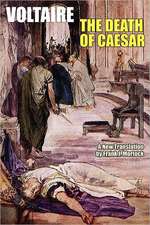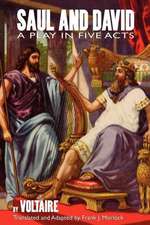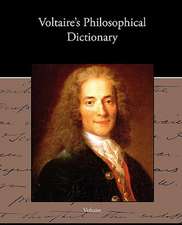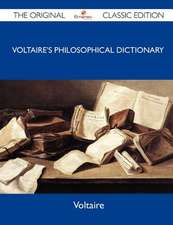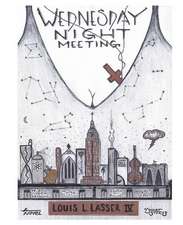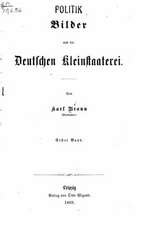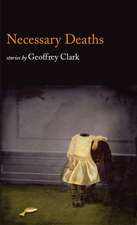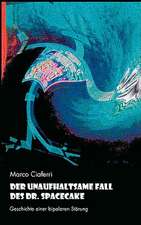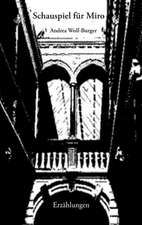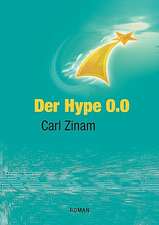Socrates
Autor Voltaireen Limba Engleză Paperback
| Toate formatele și edițiile | Preț | Express |
|---|---|---|
| Paperback (6) | 36.58 lei 3-5 săpt. | |
| – | 36.58 lei 3-5 săpt. | |
| CREATESPACE – | 62.56 lei 3-5 săpt. | |
| – | 63.56 lei 3-5 săpt. | |
| – | 65.69 lei 3-5 săpt. | |
| CreateSpace Independent Publishing Platform – | 58.51 lei 6-8 săpt. | |
| Borgo Press – 30 sep 2009 | 83.04 lei 6-8 săpt. |
Preț: 36.58 lei
Nou
Puncte Express: 55
Preț estimativ în valută:
7.00€ • 7.60$ • 5.88£
7.00€ • 7.60$ • 5.88£
Carte disponibilă
Livrare economică 01-15 aprilie
Preluare comenzi: 021 569.72.76
Specificații
ISBN-13: 9781533119667
ISBN-10: 153311966X
Pagini: 38
Dimensiuni: 152 x 229 x 2 mm
Greutate: 0.07 kg
ISBN-10: 153311966X
Pagini: 38
Dimensiuni: 152 x 229 x 2 mm
Greutate: 0.07 kg
Notă biografică
François-Marie Arouet est originaire d'un milieu bourgeois, son père était notaire. Il fait de brillantes études chez les jésuites de Louis-Le-Grand. Des vers irrévérencieux l'obligent à rester en province, puis provoquent son incarcération à la Bastille (1717). Une altercation avec le chevalier Rohan-Chabot le conduit à nouveau à la Bastille, puis le contraint à un exil de trois ans en Angleterre. Au contact des philosophes d'Outre-Manche où la liberté d'expression était alors plus grande qu'en France, il s'engage dans une philosophie réformatrice de la justice et de la société.
De retour en France, Voltaire poursuit sa carrière littéraire avec pour objectif la recherche de la vérité et de la faire connaître pour transformer la société. Au château de Cirey, en Champagne, il écrit des tragédies ("Zaïre", "La mort de César"...) et, avec moins de succès, des comédies ("Nanine"). Il critique la guerre dans "L'Histoire de Charles XII" (1731) puis s'en prend aux dogmes chrétiens dans "Epîtres à Uranie" (1733) et au régime politique en France, basé sur le droit divin, dans "Lettres philosophiques" (1734).
Des poèmes officiels lui permettent d'entrer à l'Académie Française et à la Cour comme historiographe du roi en 1746. Cependant "Zadig" l'oblige à s'exiler à Potsdam sur l'invitation de Frédéric II de Prusse, puis à Genève. Voltaire s'installe définitivement à Ferney, près de la frontière Suisse, où il reçoit toute l'élite intellectuelle de l'époque tout en ayant une production littéraire abondante.
En 1759, Voltaire publie "Candide", une de ses oeuvres romanesques les plus célèbres et les plus achevées. S'indignant devant l'intolérance, les guerres et les injustices qui pèsent sur l'humanité, il y dénonce la pensée providentialiste et la métaphysique oiseuse. Avec ses pamphlets mordants, Voltaire est un brillant polémiste. Il combat inlassablement pour la liberté, la justice et le triomphe de la raison (affaires Calas, Sirven, chevalier de la Barre...). En 1778, il retourne enfin à Paris, à l'Académie et à la Comédie Française, mais épuisé par son triomphe, il y meurt peu de temps après.
Esprit universel ayant marqué le siècle des "Lumières", défenseur acharné de la liberté individuelle et de la tolérance, Voltaire a beaucoup de succès auprès de la bourgeoisie libérale. Il laisse une oeuvre considérable. A cause de la censure, la plupart de ses écrits étaient interdits. Ils étaient publiés de manière anonyme, imprimés à l'étranger et introduits clandestinement en France.
Principales oeuvres :
Oedipe (1718)
Brutus (1730)
L'Histoire de Charles XII (1731)
Zaïre (1732)
Epîtres à Uranie (1733)
Lettres philosophiques (1734)
La mort de César (1735)
Discours sur l'homme (1738)
Zadig (1747)
Nanine (1749)
Le siècle de Louis XIV (1751)
Micromégas (1752)
La Pucelle d'Orléans (1752)
Essai sur les moeurs et l'esprit des nations (1756)
Candide (1759)
Traité sur la tolérance (1763)
Dictionnaire philosophique(1764)
Jeannot et Colin (1764)
L'ingénu (1767)
De retour en France, Voltaire poursuit sa carrière littéraire avec pour objectif la recherche de la vérité et de la faire connaître pour transformer la société. Au château de Cirey, en Champagne, il écrit des tragédies ("Zaïre", "La mort de César"...) et, avec moins de succès, des comédies ("Nanine"). Il critique la guerre dans "L'Histoire de Charles XII" (1731) puis s'en prend aux dogmes chrétiens dans "Epîtres à Uranie" (1733) et au régime politique en France, basé sur le droit divin, dans "Lettres philosophiques" (1734).
Des poèmes officiels lui permettent d'entrer à l'Académie Française et à la Cour comme historiographe du roi en 1746. Cependant "Zadig" l'oblige à s'exiler à Potsdam sur l'invitation de Frédéric II de Prusse, puis à Genève. Voltaire s'installe définitivement à Ferney, près de la frontière Suisse, où il reçoit toute l'élite intellectuelle de l'époque tout en ayant une production littéraire abondante.
En 1759, Voltaire publie "Candide", une de ses oeuvres romanesques les plus célèbres et les plus achevées. S'indignant devant l'intolérance, les guerres et les injustices qui pèsent sur l'humanité, il y dénonce la pensée providentialiste et la métaphysique oiseuse. Avec ses pamphlets mordants, Voltaire est un brillant polémiste. Il combat inlassablement pour la liberté, la justice et le triomphe de la raison (affaires Calas, Sirven, chevalier de la Barre...). En 1778, il retourne enfin à Paris, à l'Académie et à la Comédie Française, mais épuisé par son triomphe, il y meurt peu de temps après.
Esprit universel ayant marqué le siècle des "Lumières", défenseur acharné de la liberté individuelle et de la tolérance, Voltaire a beaucoup de succès auprès de la bourgeoisie libérale. Il laisse une oeuvre considérable. A cause de la censure, la plupart de ses écrits étaient interdits. Ils étaient publiés de manière anonyme, imprimés à l'étranger et introduits clandestinement en France.
Principales oeuvres :
Oedipe (1718)
Brutus (1730)
L'Histoire de Charles XII (1731)
Zaïre (1732)
Epîtres à Uranie (1733)
Lettres philosophiques (1734)
La mort de César (1735)
Discours sur l'homme (1738)
Zadig (1747)
Nanine (1749)
Le siècle de Louis XIV (1751)
Micromégas (1752)
La Pucelle d'Orléans (1752)
Essai sur les moeurs et l'esprit des nations (1756)
Candide (1759)
Traité sur la tolérance (1763)
Dictionnaire philosophique(1764)
Jeannot et Colin (1764)
L'ingénu (1767)


